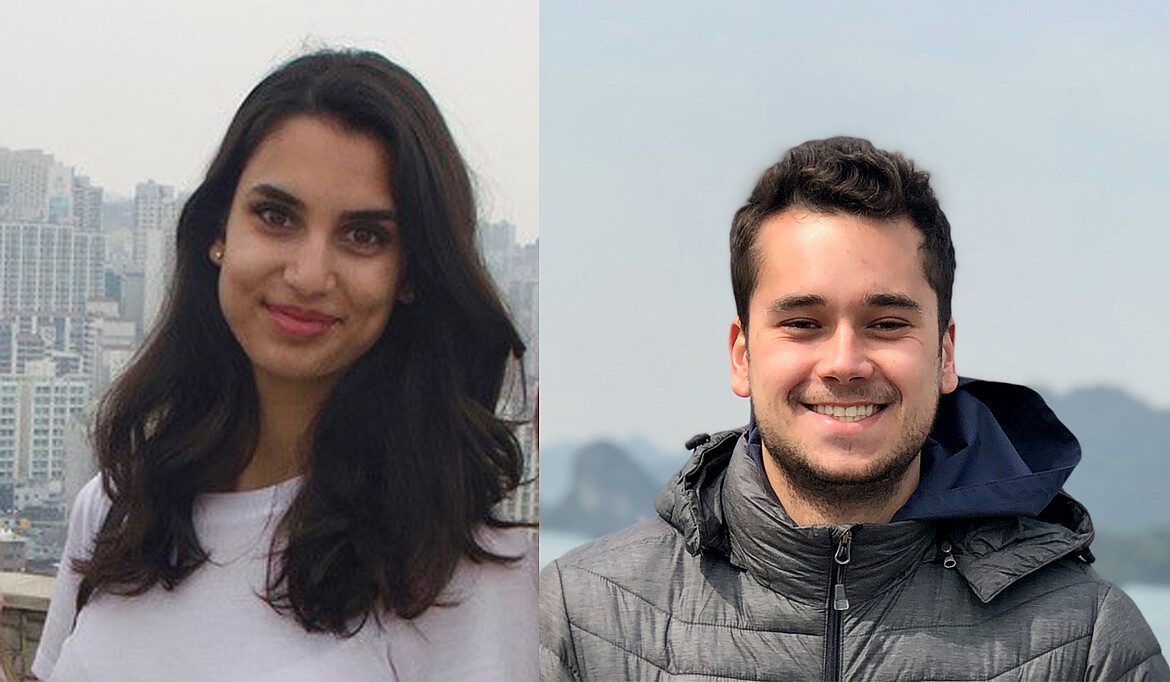I thought that taking part in this project would somehow allow me to make an impact during my studies at RSM. Ultimately, I think the SDGs are very relevant topic and everyone should be thinking about them
Tobias Moreira de Souza Sanden
While many RSM activities have our mission – to be a force for positive change in the world – embedded in them, students are also making their own independent contributions to positive change. Tara van Leeuwen and Tobias Moreira de Souza Sanden have been selected, along with six of their peers, to volunteer on a project to audit RSM’s contributions to the UN’s Sustainable Development Goals (SDGs) and to present them in a real-time SDG Dashboard by summer 2021.
What interested you about the SDG Dashboard project?
Tobias: “First of all it was the element about creating a dashboard – which makes it a very practical project – but also learning about how to assess contributions to the SDGs is something very relevant. I found it a good combination, to learn about both fields.” Tara agrees, “Not only the SDGs and their relevance, but also being able to see behind the scenes of building a dashboard and the data behind it all.”
What is it about building a dashboard that you find particularly interesting?
Tara: “I think transparency is really important right now. By creating more transparency, you can rebuild trust, which I think is lacking today within technology and society at large. So, I think in doing this project, we could set an example for other schools and businesses.”
Tobias: “Being in the end-to-end process and seeing how it will come to life is exciting. Also, on a personal level, being new to RSM this year (not having done my bachelor here), it’s great to see so much being done and the value of projects like this.”
What does the project entail and what is your role in it?
Tara: “We’re tasked with preparing data for a framework. Each of us in the project group was assigned a different theme, for example, transportation, which is linked to CO2 emissions and electrical charging areas across campus. We started with the STARS/AASHE 2.1 Technical Manual and decided which points of the self-reporting framework are and which aren’t relevant to RSM. From this we create our own tentative manual, and then we go to the ‘gatekeepers’ that can offer us information and insights.
Who are the gatekeepers and how do you identify which data you need to collect?
“We’re currently still in the data collection and planning phase. There are numerous projects and initiatives about sustainability happening on campus, so we need to make an inventory of that and then find out who has information on them – those people are the gatekeepers.”
What was your personal motivation to join the project?
Tara: “During my bachelor years, I always intended to join a study association but didn’t end up doing so because I was focused on studying. When time came for my master’s, I thought I wanted to do something to broaden my skill set and knowledge. On a more spiritual note, I like reading about religion and morality, and thinking about the consequences of your actions. This aligns with my having become more interested and conscious about the SDGs, and in particular about our waste. So, it seemed like a nice project to join.”
Tobias: “I think I underwent a similar transition as Tara. At the start of my master degree, I was looking for a source of personal development and doing something impactful. I thought that taking part in this project would somehow allow me to make an impact during my studies at RSM. Ultimately, I think the SDGs are very relevant topic and everyone should be thinking about them.”
How has it been to collaborate with COVID-19 restrictions?
Tobias: “We haven’t actually met personally with the members of the team but I think it’s going better than expected. We’re still able to get things done through online meetings and somehow make it personal.”
Tara: “In the first session, we did a lot of team building by practicing names. And even though I haven’t met my peers I still feel like I have met them. It does feel really personal even though we’re dispersed across different countries. Everyone is very lively and passionate and that contributes to feeling connected.”
When would you say the project has been successful?
Tobias: “We’re still early on but I guess we will be able to say so when we see the outcome of our work and when we see that everything has been collected in one dashboard and it looks good. And of course if people actually use it, that would be the best outcome.”
In addition to the SDG Dashboard project and their studies, both Tara and Tobias have spent time in lockdown developing themselves. They have both completed a process mining course, which teaches how to use software to identify the bottlenecks in processes and how they can be removed to improve progress, and a data visualisation course.
